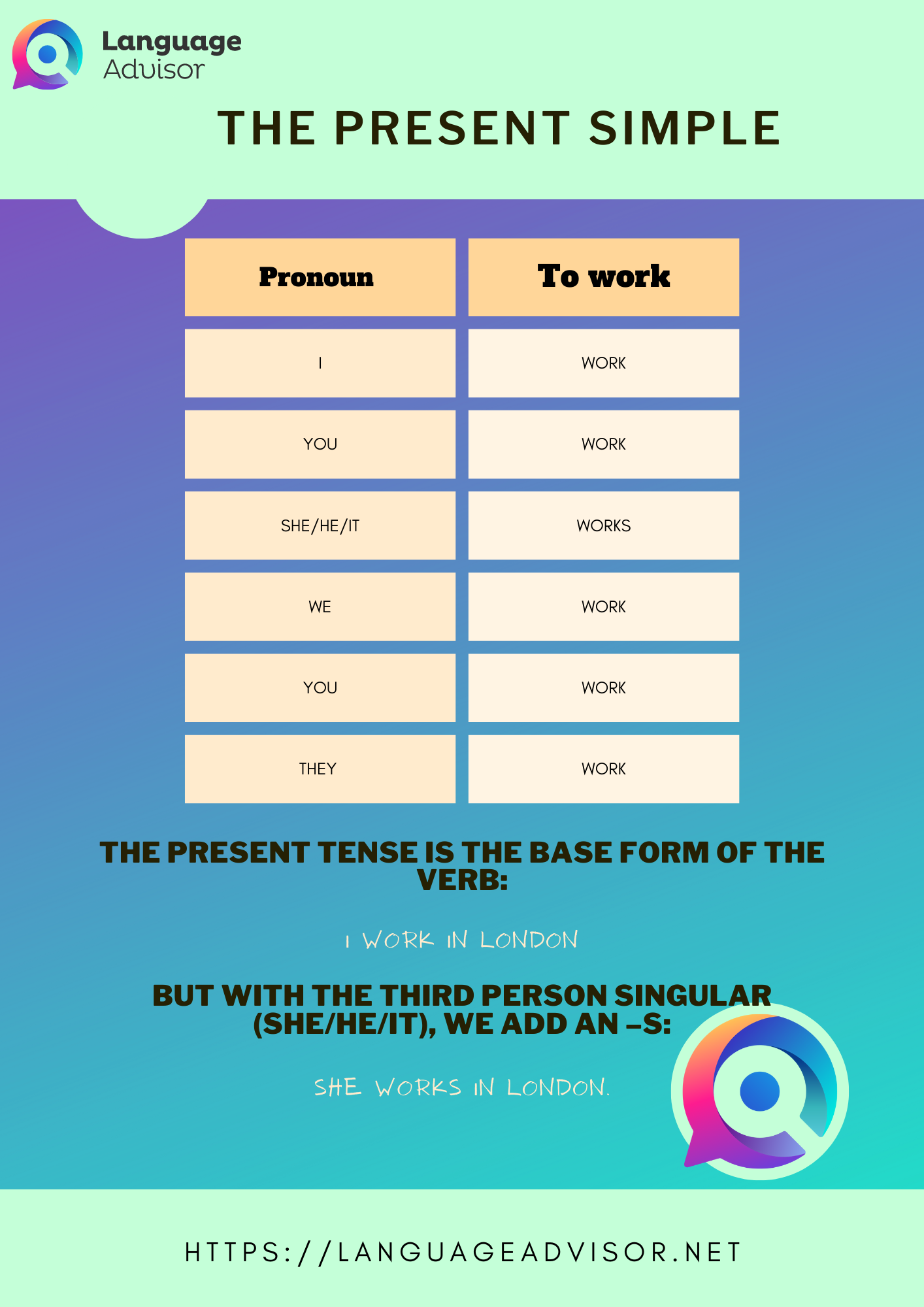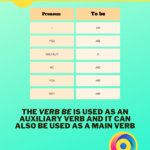The Present Simple exercises. English grammar with exercises. The present simple tense exercises. Free eBook and printable PDF
The Present Simple exercises
The Present Simple
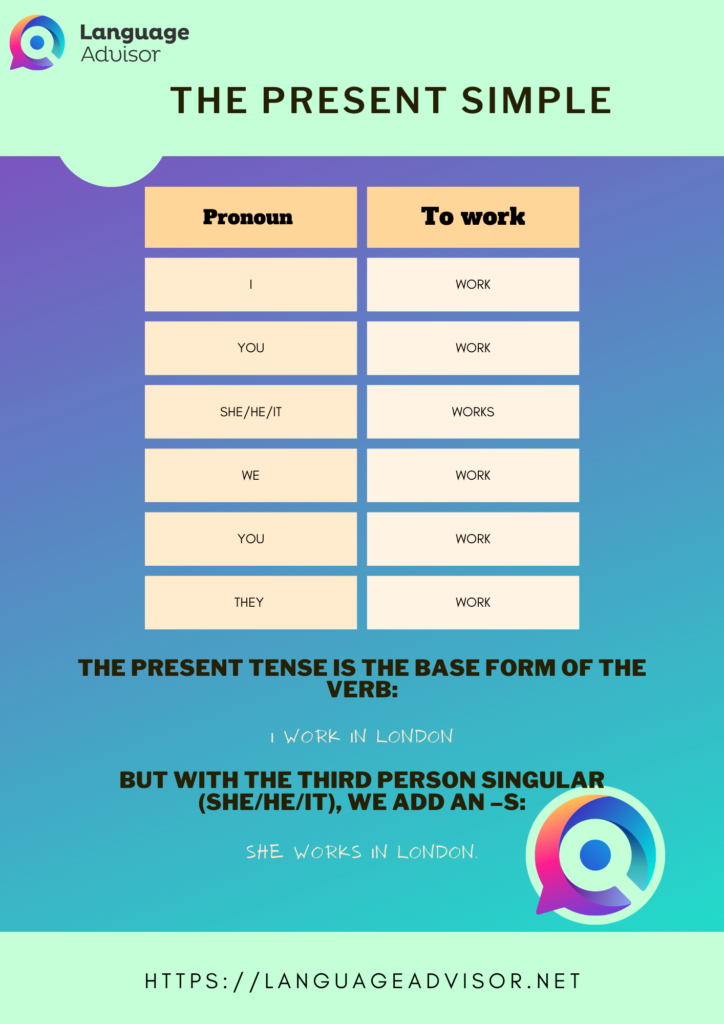
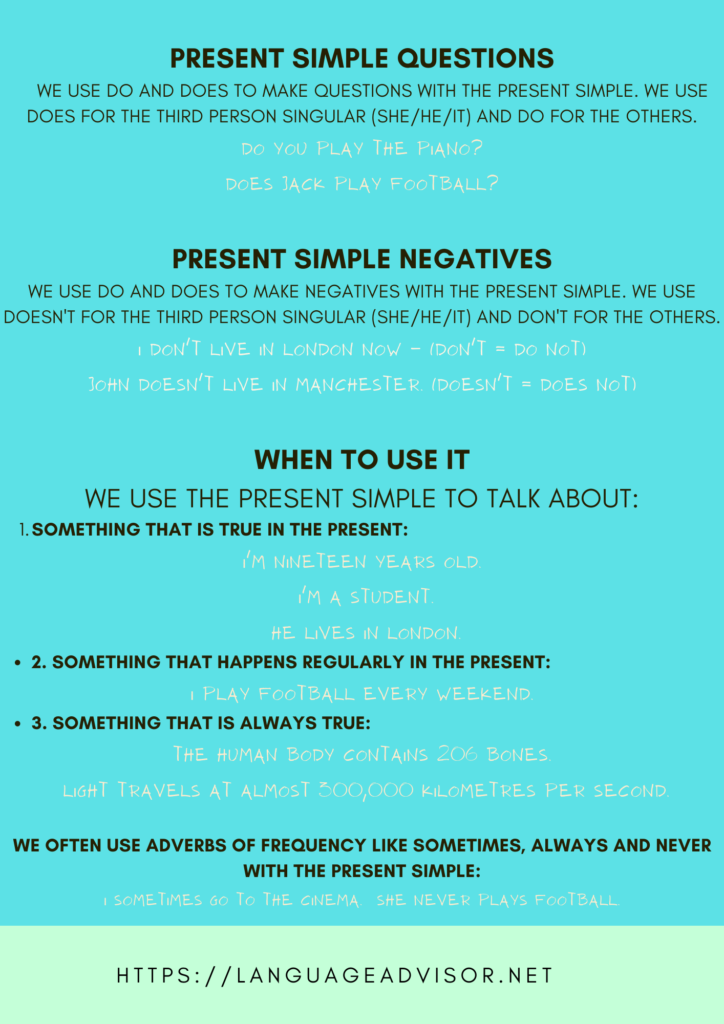

The present simple
| Pronoun | To work |
| I | WORK |
| YOU | WORK |
| SHE/HE/IT | WORKS |
| WE | WORK |
| YOU | WORK |
| THEY | WORK |
The present tense is the base form of the verb:
I work in London
But with the third person singular (she/he/it), we add an –s:
She works in London.
Present simple questions
We use do and does to make questions with the present simple. We use does for the third person singular (she/he/it) and do for the others.
Do you play the piano?
Does Jack play football?
Present simple negatives
We use do and does to make negatives with the present simple. We use doesn’t for the third person singular (she/he/it) and don’t for the others.
I don’t live in London now – (don’t = do not)
John doesn’t live in Manchester. (doesn’t = does not)
WHEN to use it
We use the present simple to talk about:
1. something that is true in the present:
I’m nineteen years old.
I’m a student.
He lives in London.
2. something that happens regularly in the present:
I play football every weekend.
3. something that is always true:
The human body contains 206 bones.
Light travels at almost 300,000 kilometres per second.
We often use adverbs of frequency like sometimes, always and never with the present simple:
I sometimes go to the cinema. She never plays football.
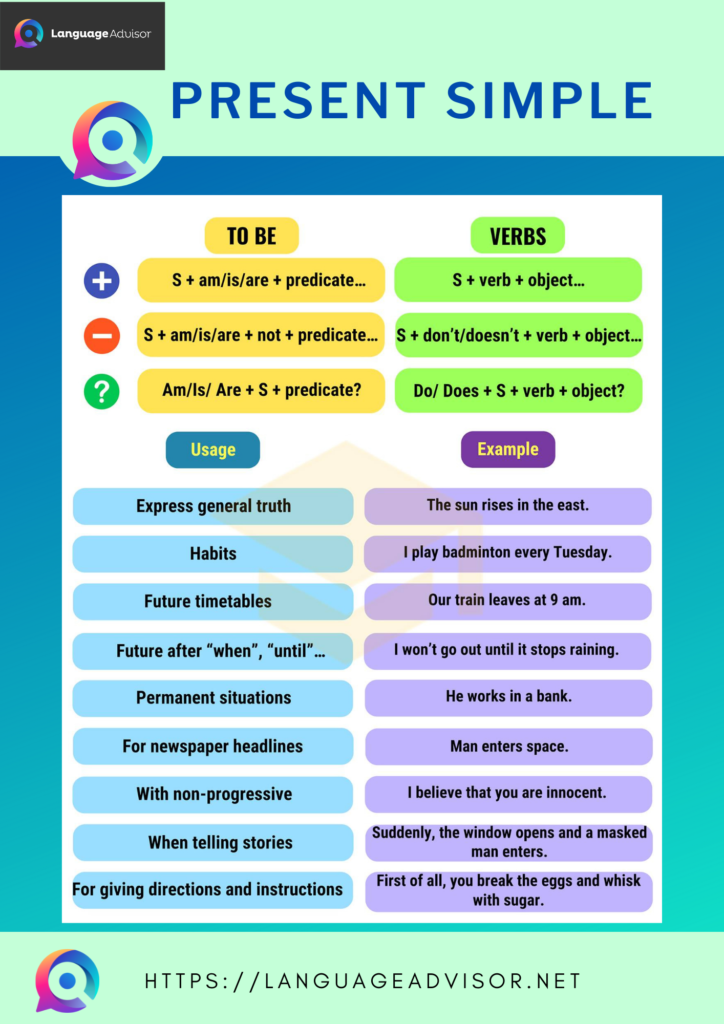






The present simple tense exercises
THE PRESENT SIMPLE
EXERCISE 1.
What do the following characters do every day?
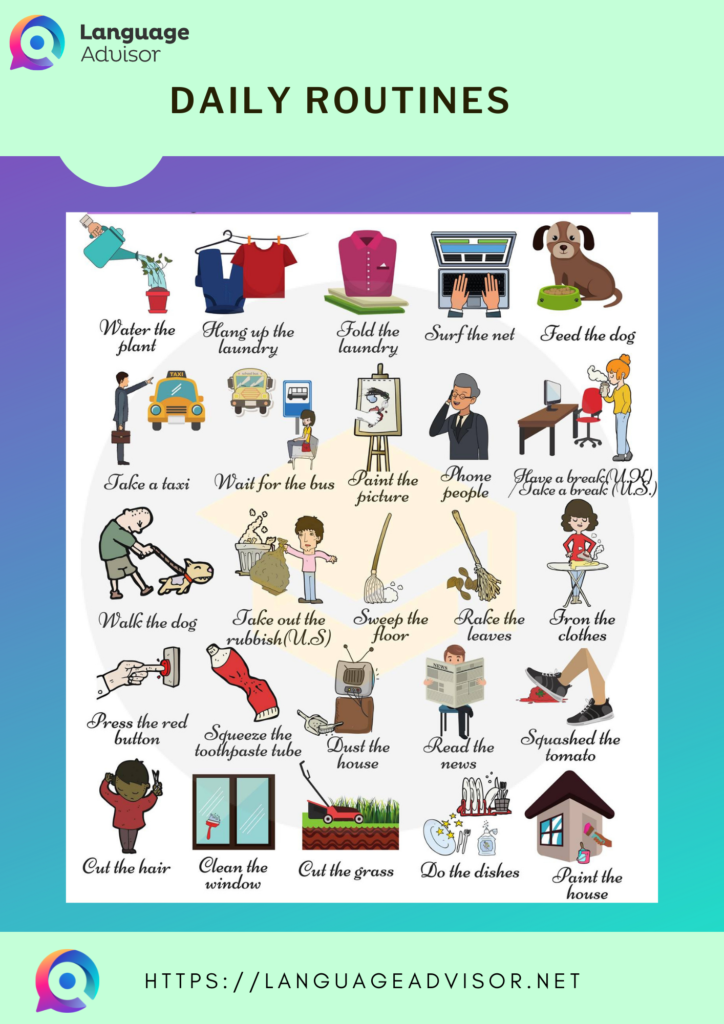

EXERCISE 1.
What do the previous characters do every day?
EXERCISE 2
Read the following text and answer the questions:
Tom usually gets up at 7.30. He has a shower, gets dressed and has breakfast with his wife and his two children. Then he goes to work. He works in a hospital: he is a doctor. He starts at 9 a.m. and he finishes at 6 p.m. During the morning he visits his patients and he talks to them. At 1 o’clock he has lunch with his colleagues. When he finishes work he walks to the swimming pool, where he has a swim. Then he goes home and he plays with his children. They have dinner at 8 p.m. After dinner he listens to music or he watches TV. He usually goes to bed at 11.30.
What time does Tom usually get up?
Where does he work?
What time does he start work?
What does he usually do in the morning?
What does he do at 1 o’clock?
When does he go to the swimming pool?
What does he do when he goes home?
What time does he usually have dinner?
What does he do after dinner?
What time does he go to bed?
EXERCISE 3
Rewrite these sentences in the question form:
e.g. I eat toast for breakfast.
Do you eat toast for breakfast?
1. I wake up at 7 a.m. ______________________________
2. I have a shower. ______________________________
3. I have breakfast at 7.30. ______________________________
4. I go to work. ______________________________
5. Bob likes pop music. ______________________________
6. They want to eat an ice-cream. ______________________________
7. Tom has lunch with Meg. ______________________________
8. Jim listens to music. ______________________________
9. We get up at 8.30. ______________________________
Meg goes to the theatre. ______________________________
EXERCISE 4
Rewrite these sentences in the negative:
James works with Tom. ______________________________
You listen to the radio. ______________________________
We walk to the park. ______________________________
I sleep from 11 p.m. to 7 a.m. ______________________________
They want to drink a coffee. ______________________________
They go to bed at 11 p.m. ______________________________
Sam has lunch at 1 p.m. ______________________________
I like dogs. ______________________________
I know the meaning of this word. ______________________________
Richard cycles to work. ______________________________
EXERCISE 5
Write questions using the prompts.
e.g. What/ be / this?
What is this?
where / you / from?
who / she?
you / be/ happy/ now ?
how / be/ Mary /today?
Alan / be / one of your school mates?
this / be / Mike’s kite ?
EXERCISE 6
Write questions related to the following answers.
e.g. I am from Greece.
Where are you from?
That is Joe, one of my best friends.
Yes, it is .
No she isn’t . My mother is a housewife.
The director of the company is 40 years old.
No. I am not. I am from Oxford.
Her name is Lucy.
This is a skipping rope.
No, they aren’t. They are from Brazil.
EXERCISE 7
Match the questions with the correct answer.
What are you like? I’m fine
What is he like? He’s tall and thin
How is she? He’s all right
How are you? She’s short and fat
What is she like? I’m slim and dark
How is he? She’s tired
EXERCISE 8
Read the dialogue and correct the mistakes, rewrite the correct version in the space provided.
“He has tall with white hairs. He’s about 45 year old, and he do have three children.
He works to a shop. He get up at 7.00a.m. He a happy man, and he sing in the shower.
If his wife hear him, she want to kill he!“
EXERCISE 9
Make true sentences.
| I My friendMy teacher | am is/isn’t can/can’t | Italian/English/Spanish/otherswim/ski/dance/singold/youngeasy/difficult |
e.g. I am Italian.
_________________________________________
_________________________________________
_________________________________________
_________________________________________
_________________________________________
EXERCISE 10
Match the questions and answers.
1. Can you describe him? Yes, you can.
2. Can you hear me? He’s tall and blond.
3. Can I have a pizza? No, he can’t
4. Can she swim? No, I can’t
5. Can he ski? Yes, she can
EXERCISE 11
Fill in the gaps with a suitable form of the verb:
e.g. My teacher says to me: Be quiet! (to be)
My boss says to me:_______________ to work late! (to not come)
My dancing partner says to me: _______________ your head! (to not move)
My child says to me:__________ at me! (to look)
My friend says to me:__________ with me! (to come)
EXERCISE 12
Choose the correct verb to complete the sentences.
e.g. You smoke/eat/sleep a cigar.
He rides/catches/drives a bicycle.
I climb/watch/see the Eiffel Tower.
She sings/shouts/meets a song.
I play/kill/sound the violin.
You write/speak/hear letters.
He sees/hears/watches television.
She feels/wants/speaks ill.
They kill/die/live people.
She eats/walks/watches meat.
EXERCISE 13
Fill in the spaces with a suitable verb.
I get up at 7.30 A.M. and then I __________ a shower/bath. I __________________ and _______________, so I’m not hungry. I also _______________ a cup of coffee. I___________ the car and ___________ to work, but sometimes if the weather is nice I _______________.I ___________ for four hours, and then _________________ at 1 P.M. I ____________ work at 6 P.M. , and then I _________ home.
EXERCISE 14
Correct the mistakes in the description about Michael.
“He name is Michael and he a Spanish teacher. He has 25 years old. His birthday is in 15th July. He live in Milan but his from Spain. He’s two brothers. They called Julio andNChristian. He family live in Barcelona.”
EXERCISE 15
Look at Bob’s timetable and answer the following questions:
| TIME | ACTION |
| 7.30 a.m. | WAKES UP |
| 8:00 a.m. | GETS UP, WASHES , GETS DRESSED |
| 8:30 a.m. | HAS BACON AND EGGS FOR BREAKFAST |
| 9:00 a.m. | DRIVES TO WORK |
| 9:30 a.m. | STARTS WORKING |
| 11:00 a.m. | GOES FOR A COFFEE WITH HIS COLLEAGUES |
| 1:00 p.m. | HAS LUNCH AT THE IRISH PUB |
| 5:00 p.m. | LEAVES OFFICE |
| 6:00 p.m. | GOES JOGGING |
| 7:00 p.m. | GOES OUT FOR DINNER WITH JANET |
| 10:00 p.m. | WATCHES “HURLING” ON TV |
| 11:30 p.m. | GOES SLEEPING |
What does Bob do at 8:00 a.m.?
What does Bob have for breakfast?
Does he go for lunch alone?
What does Bob usually do in the afternoon?
Does he go to bed very late at night?
Does he usually go jogging in the morning?
What time does he go out with Janet?
What does he like watching on TV?
EXERCISE 16
Read Bob’s timetable again and then briefly describe a usual day in his life:
Bob usually wakes up at 7:30
EXERCISE 17
Read the dialogue and correct the mistakes.
John: Hey, Susan! How goes you?
Susan: Fine! I happy today, because it’s weekend. I want go to cinema tonight, but I doesn’t know if I can.
John: What not?
Susan: My grandparents and my cousins come to dinner in Saturday nights and so I have stay in home.
John: Oh well, mind never. Maybe you can goes tomorrow? We can goes together- there a good horror films on at the Odeon.
Susan: Oh, no, not a horror film! They is horrible- I don’t likes bloods.
John: Really? I love!





All downloads are in PDF format
The present simple exercises: eBook and PDF
BROWSE THE EBOOK ONLINE OR DOWNLOAD THE PDF FOR FREE





DOWNLOAD THE PDF FOR FREE






